“Ephrem teaches as if a fountain was flowing from his mouth.”
~St. Basil the Great
No saint other than Ephrem the Syrian (306-373 AD) has been canonized for writing poetry. He was such a persuasive poet and hymn writer in the early Church that he was called the “Harp of the Holy Spirit”.
He is acknowledged as a saint by the Orthodox, Anglican, and Catholic churches, and in 1920 Pope Benedict XV named him a Doctor of the Church due to the magnificence of his poetic writings and treatises.
St. Ephrem was truly an extraordinary figure of Christian antiquity. An early church historian, Sozomen, claimed that he wrote over 3 million verses, of which some 400 poems as well as dozens of other prose writings and sermons have come down to us through the ravages of history.
And when I say ravages, I mean ravages. Ephrem probably saw more of them in his six decades than most people would see in ten lifetimes. I’ll explain more about this below.
Origins
Ephrem is called “The Syrian” because he is one of only a handful of early Church Fathers whose writings were composed in an ancient dialect of Aramaic called Syriac.
Like all Semitic languages, it is written from right to left and is wonderfully beautiful even to the eyes of those who cannot read the language. It seems to exude elegant beauty on its own. One can only wonder what it must have been like to hear it spoken in a sermon by the mouth of St. Ephrem himself.
Here are the 22 letters of the Syriac alphabet and below these is a manuscript of one of St. Ephrem’s prose commentaries.
The writing and language are almost works of art in themselves! (As I’ve noted elsewhere, Aramaic was the language Jesus Himself spoke and is the oldest continually spoken language in the world, even to this day.)
St. Ephrem is also referred to as the Deacon of Edessa, the Sun of the Syrians, and the Pillar of the Church—all poetic titles that fit the poet extraordinaire of the ancient Church!
He was known to other great churchmen of the same era too—St. Basil and St. Jerome—which in itself is a testimony to Ephrem’s fame even during his lifetime. Basil wrote to the Greek-speaking churches and Jerome wrote in Latin, but they knew the Syrian poet. Everyone in the ancient Church knew the Syrian.
Ravages
I mentioned the ravages of time, and St. Ephrem was no stranger to them. He lived most of his life in a large town on the very edges of the Roman Empire called Nisbis, then part of the ancient province of Syria.
The city was a fortress of immense magnitude because it was considered a kind of buffer against the invading Persians, who were always the nemesis of Rome.
As a man in his middle age, Ephrem witnessed three attempts by the Persians to conquer the city (in 337, 346 and 350 AD). In the second attempt, the Persians actually redirected an entire river to break down the walls and flood the city!
Their strategy ultimately worked against them because they themselves couldn’t get through the flood to conquer the city, so the locals quickly shored up the walls once again to keep them out.
Ephrem’s church is dedicated to a Syrian saint named St. Jacob, and it is still standing today overlooking the ruins of the ancient community.
From this church Ephrem exercised his ministry as a deacon and taught the true faith to the Christians who only decades before that had been freed from official persecutions by the Emperor Constantine (in 313 AD). He served his bishop, also named Jacob, who had actually attended the Council of Nicea in 325 AD. With Jacob, he lived the rest of his life defending Nicea’s teachings, which we still profess today in the Apostles Creed.
The city’s perseverance against the Persian sieges didn’t stop a subsequent Roman Emperor, Jovinian, from handing Nisbis over to the Persians without a fight in 363. The pagan emperor’s reason for doing so was precisely because it was a center of Christian faith.
Ephrem and his community were summarily exiled and fled about 100 miles due west to another Christian city, Edessa, where he lived for another decade and died in his mid-sixties. His demise came probably from the effects of starvation soon after ministering for a year to victims of a horrible famine.
As I said, Ephrem knew the ravages of time and history.
Harp of the Holy Spirit
St. Ephrem’s most famous title is “Harp of the Holy Spirit” due to his eloquence in writing sublime hymns, treatises, and sermons. I think you will see why he gained that reputation when you read a few snippets of his marvelous verses.
Given the volume of his writing, I can only give a few select excerpts, but the last item, the “Sermon on the Cross”, contains a link to the full poem, which is entirely worth the read.
On The Incarnation
The Lord entered [Mary], and became a servant; / The Word entered her, and became silent within her; / Thunder entered her, and his voice was still; / The Shepherd of all entered her; he became a lamb in her, / And came forth, bleating.
On the holy Virgin Mary
Come ye wise, let us admire the virgin mother, / David’s most lovely daughter, / who gave birth to Wonder.
On the Tree of Life
Greatly saddened was the Tree of Life. / When it beheld Adam stolen away from it; / It sunk down into the virgin ground and was hidden—To burst forth and reappear on Golgotha.
The Devil’s Lament
The Evil One said: “I tempted him, after his fast, with pleasant bread, but he desired it not. To my grief I strove to learn a psalm, that by his psalm I might take him as a prey: I paused and learned it a second time, but he made my second trial to be vain. I brought him up to a mountain and showed him all possessions; I gave them to him and he was not moved. Better was it for me in the days of Adam, who gave me no great trouble in teaching him.”
The Evil One ceased from his activity and said, “A cause of idleness to me, is this Jesus; for lo! The publicans and harlots take refuge in him. What work shall I seek for myself? I who was master to all men, to whom shall I be a disciple?”
On the Good Thief
There came to my ear from the scripture which had been read. / A word that caused me joy on the subject of the Thief; / It gave comfort to my soul amidst the multitude of its vices, telling how he had compassion on the Thief. / Oh, may he bring me too into that Garden at the sound of whose name I am overwhelmed by joy; / My mind bursts its reins as it goes forth to contemplate him.
On Old Age
Bind up your thoughts, Old Age, in Paradise / Whose fragrance makes you young; / Its wafting scent rejuvenates you. / And your stains are swallowed up. / In the beauty with which it clothes you. / In Moses, he depicted for you a parable; / His cheeks, ashen with age, became shining and fair; / A symbol of old age that in Eden again becomes young.
Sermon on the Cross
Death trampled our Lord underfoot, but he in his turn treated death as a highroad for his own feet. He submitted to it, enduring it willingly, because by this means he would be able to destroy death in spite of itself. Death had its own way when our Lord went out from Jerusalem carrying his cross, but when by a loud cry from that Cross he summoned the dead from the underworld, death was powerless to prevent it.
May the words of St. Ephrem, on this Pentecost Sunday, glorify the Lord in His Church. And may the Harp of the Holy Spirit intercede for us and obtain for us the greatest joy of the Spirit!
----------
Poem Credits: “Hymns on the Nativity of Christ in the Flesh” (Quoted in Sally Read, 100 Great Catholic Poems, Word on Fire, 2023, 12.); Boston Catholic Journal, Hymn 35, 4-5; Sebastian Bock, St. Ephrem: Hymns on Paradise, St. Vladimir’s Seminary, Press, 1990; 60, 122, 131.
Photo Credits: Feature image and stained glass via Pixabay; Syriac alphabet (Mathen Payyappilly Palakkappilly); First Icon (Orthodox nun near Oradea); Church excavations (Oystercard); Commentary (Public domain).






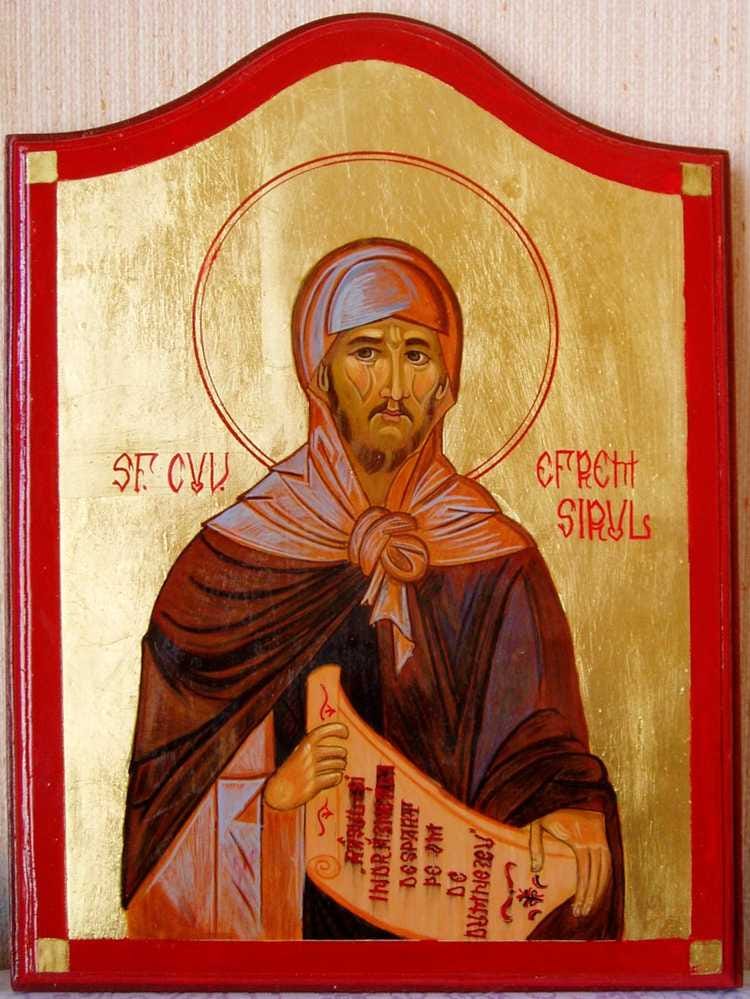
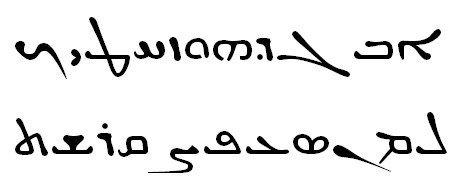
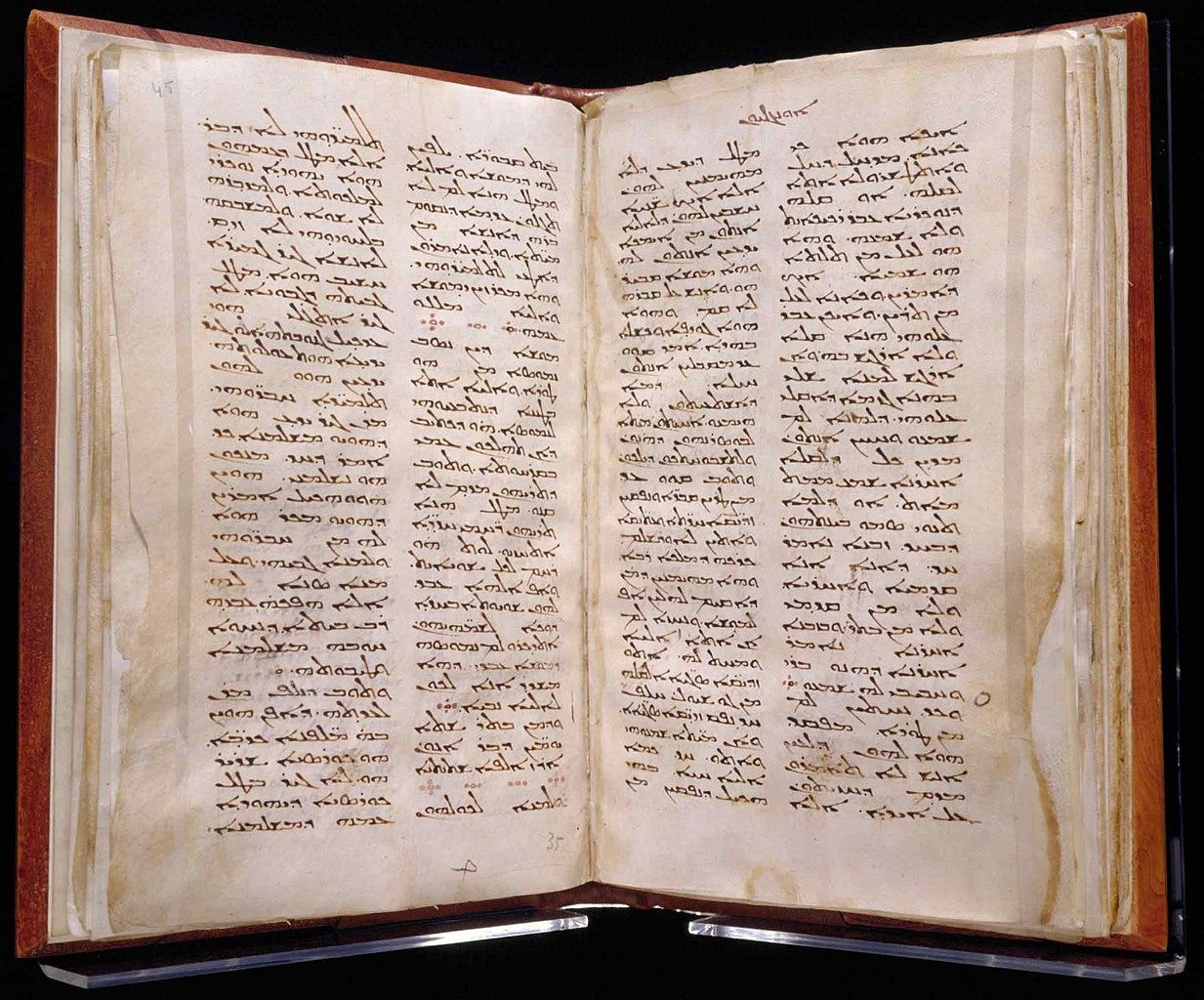
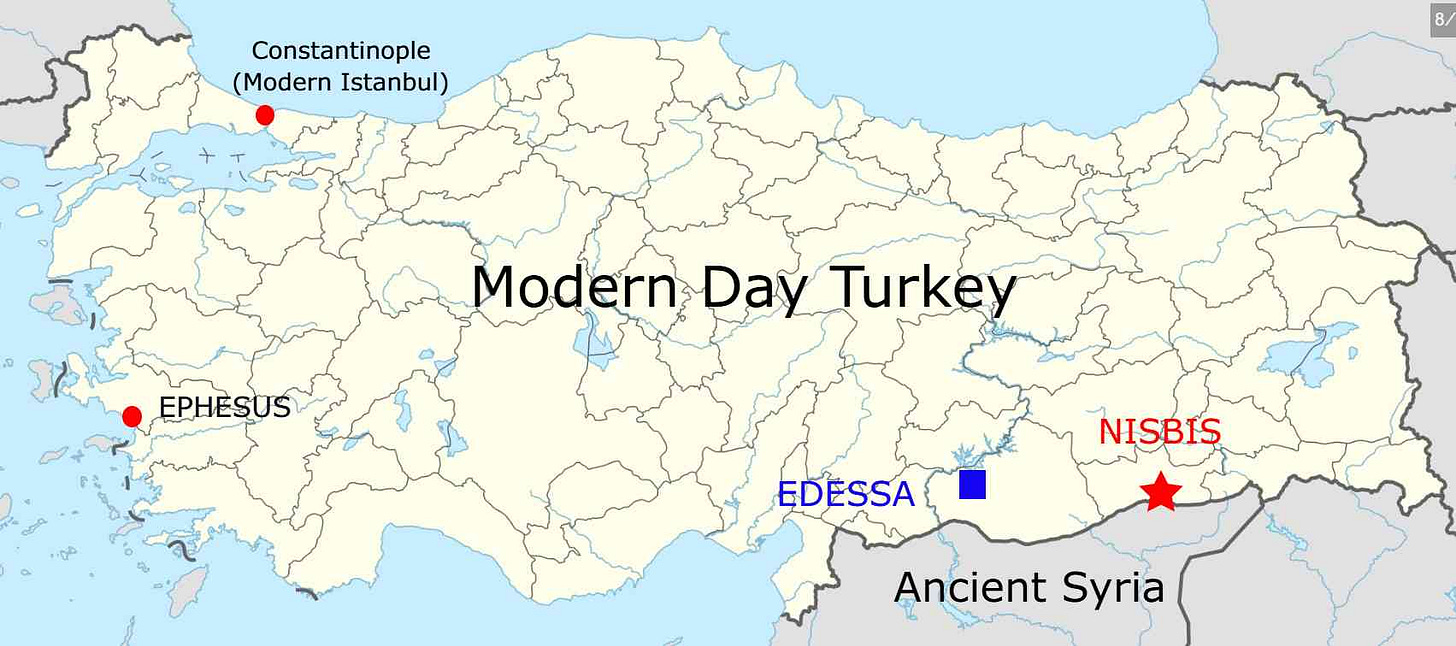
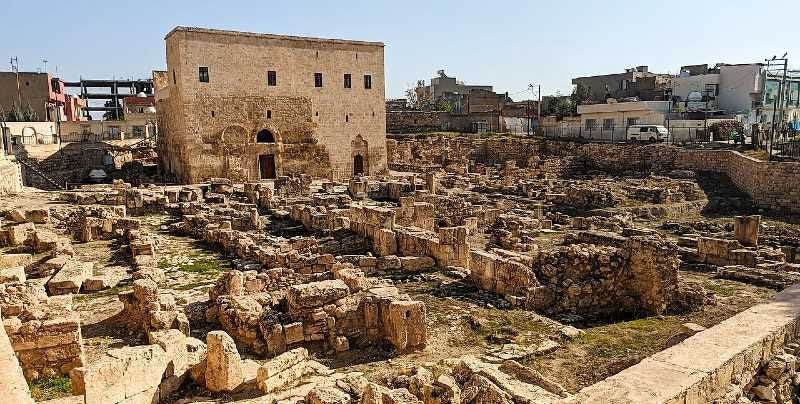

You send us such beautiful stories. If I am not mistaken , Ephrem is another way of saying ABRAHAM.
Thank you, Peter. I had never heard of St. Ephrem before. His words are beautiful, calling one to contemplation of eternal truths. I really enjoyed this post.